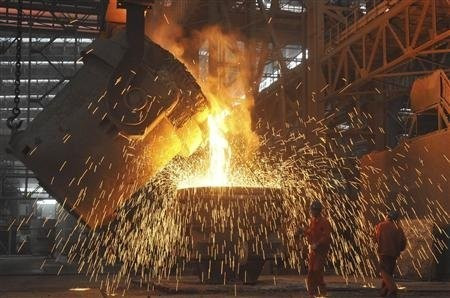China's Official PMI Shows Expansion in Manufacturing in Contrast to HSBC PMI

Two separate surveys on China's manufacturing sector indicated mixed activity for the month of July, amid rising concerns about continued slowdown in the economy.
The official Purchasing Managers' Index (PMI), compiled by the National Bureau of Statistics (NBS), unexpectedly rose to 50.3 in July from 50.1 in June. Economists had expected a slowdown in activity to 49.9.
Meanwhile, the HSBC PMI showed contraction for the third straight month, declining to 47.7 in July from 48.2 in June. The reading was consistent with the flash PMI released earlier in July. Any reading below 50 indicates contraction in the manufacturing sector.
While the official PMI surveys bigger companies, the HSBC PMI tracks smaller firms primarily in the private sector.
According to official data, the production sub-index picked up to 52.4 in July, from 52.0 previously. Meanwhile, new orders rose by 0.2 points to 50.6 and new export orders jumped by 1.3 points to 49.0.
Concerns over Growth
The data comes as investors fear a further slowdown in China's growth rate, following two straight quarters of decline. The world's second-largest economy expanded at an annualised rate of 7.5% in the second quarter, down from 7.7% in the previous three months.
Exports that had been key to China's unprecedented growth over two decades have experienced slower demand recently, especially from the major US and European markets. Meanwhile, China's government found it tough to boost domestic consumption enough to offset the decline in foreign demand.
Nevertheless, Chinese authorities were optimistic about delivering a 7.5% growth rate for 2013. They recently unveiled fresh measures to boost growth.
Last week, the Government said it would suspend value-added tax and turnover tax for small businesses from 1 August.
In addition, it plans to implement measures to simplify customs clearance procedures to promote exports of small and medium private enterprises. Besides, China's railway construction market would be fully opened up with a view to developing the sector further.
Masking Reality
Economists at ANZ Research are of the view that the official PMI figures are masking China's true economic weakness, despite positive sentiments.
"The higher PMI may reflect some policy measures geared towards large enterprises. It doesn't change our overall assessment of the deteriorating economy," they said.
ANZ noted that the country is suffering from tight liquidity conditions, elevated sovereign and corporate bond yields and rising local government debt.
"To prevent the economy from sliding further, the government is expected to launch more favourable policies to support emerging industries and small and medium-sized enterprises," ANZ economists said.
They added that the People's Bank of China should shift to a more accommodative monetary policy stance and cut rates in order to revive the slowing economy.
© Copyright IBTimes 2025. All rights reserved.






















